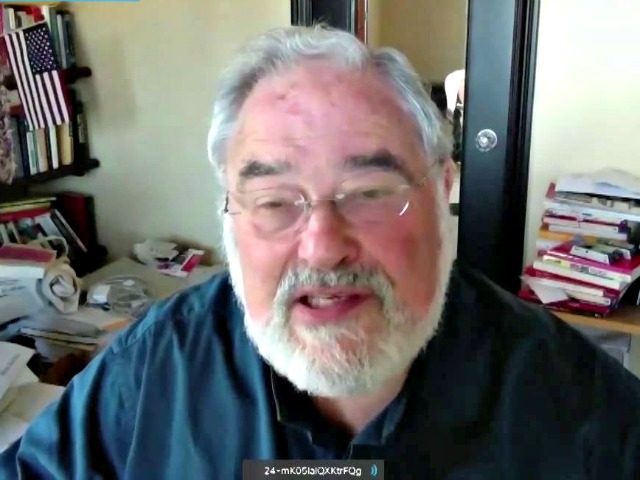Breitbart is a “very extreme right” organization that pumps out “fake news” but has no impact in the real world because it is ignored by the mainstream media.
I learned this from a Berkeley professor of linguistics called George Lakoff who was given space by the BBC to spout his views, virtually unchallenged, for half an hour this week on a Radio 4 programme called Word of Mouth.
Lakoff was introduced as an “eminent linguist” at the “forefront of the debate.” But no indication was given by the presenter Michael Rosen that he is, in fact, a left-wing professor from a left-wing university best known for writing left-wing books about how awful conservatives are and, most recently, for his vocal opposition to Donald Trump.
Perhaps this is because Rosen is left-wing himself.
As I’ve argued over similar issues before, none of this would matter a damn if Radio 4 were a commercial channel paid for by advertising or a subscription channel for smug liberals who wanted none of their prejudices challenged.
But Radio 4 is neither of those things. It’s a branch of Britain’s state broadcasting arm, the BBC — an organization funded by a compulsory subscription fee which all users are obliged to pay on pain of imprisonment. While it’s true that you don’t need a TV license to listen to the radio, it’s also true that Radio 4 is a long-established beneficiary of the BBC’s quasi-monopolistic domination of Britain’s airwaves. It has virtually no competition in the field of spoken-word features on the radio, firstly, because it has dominated the medium for so long and secondly because it is so massively subsidised (hence the lack of irritating adverts!), it would be virtually suicidal for any commercial venture to try to compete with it. In return for this extremely privileged position—which ought, by rights, to have long since been withdrawn by anti-monopoly regulators — it is obliged under the terms of the BBC’s charter to produce output that is rigorously fair and balanced.
This is why we should get cross: not because nasty, horrid, untrue things were said about Breitbart, but because nasty, horrid, untrue things were said about Breitbart by an organization wearing the mantle of authority and the mask of objectivity.
Whether rightly or no, the BBC is a media outfit that commands considerable respect around the world. By allowing this professor to make his claims unchallenged on air, the BBC has legitimized the malign, dangerous, and defamatory notions that Breitbart is a) unprofessional, b) outside the realms of acceptable public discourse, and c) on par with the Nazis, the fascists, the Ku Klux Klan, and all the other groups routinely associated with the “extreme right.” And, note, that “extreme right” was not the phrase Lakoff used. Nope, it was “very extreme right.”
Now, suppose for a moment the BBC had managed to find a conservative professor of linguistics — unlikely, I know, but just suppose… — and he’d vented about some left-wing media outfit he didn’t like, calling it “extreme left-wing” and accusing it of putting out “fake news.” How do you think he would have been treated by the BBC?
At the very least, I would suggest, the BBC would have invited him to justify his criticism. He certainly wouldn’t have been given the free pass that was afforded this Berkeley leftist.
The other thing that would have been routinely expected of him is a degree of expertise. What, after all, is the point of inviting an “expert” on if he’s not going to display superior insights into the subject that is supposedly his field?
But, shamingly, Lakoff failed almost completely on this score.
He claimed that “snowflake” is used as a “slur against gays, who are seen as delicate and flakey.” Really? I don’t think I’ve ever seen “snowflake” used in that context. It’s used as a term of mockery for hypersensitive millennials who prefer to be protected from ideas or language they don’t agree with, whether they happen to be gay or straight is neither here nor there.
He claimed that the phrase “alt right plays on the word ‘alt,’ meaning old, calling up issues from Germany, which is interesting.” Do you see what the professor did there? Yep. Shameless beyond belief, I know, but he really did just invent a spurious etymology for the “alt” in “alt right.” (Of course, it stands for alternative and has nothing to do with the German word for “old.”) He then used it as a way of hinting that the people involved in the “alt right” are sorta, kinda like Hitler.
He claimed that the term “fascists” has been embraced by people on the right and that they are proud to define themselves in opposition to the “antifas.” Nope. Again, he has got it completely wrong. It’s the left that uses “fascist” ad nauseam to describe anyone it disagrees with. “Antifa” is a term the left has chosen to point up this false distinction.
He claimed that “virtue-signalling” is a phrase proudly used by progressives to indicate “I know what’s right. These are our values.” Again, 100 percent incorrect, professor. “Virtue-signalling” was a phrase coined by the classical liberal/libertarian journalist James Bartholomew in the Spectatori to mock the left’s priggish self-righteousness.
This, remember, is a professor of linguistics speaking. Knowing this stuff is his taxpayer-funded job. But though he doesn’t appear to have mastered even the basics, he is yet taken seriously enough by the BBC to spout his vile and ignorant prejudice for a full half-hour on an afternoon radio show.
Fake news indeed.

COMMENTS
Please let us know if you're having issues with commenting.